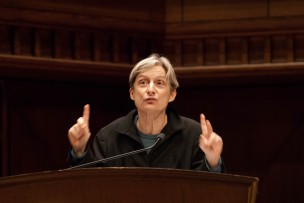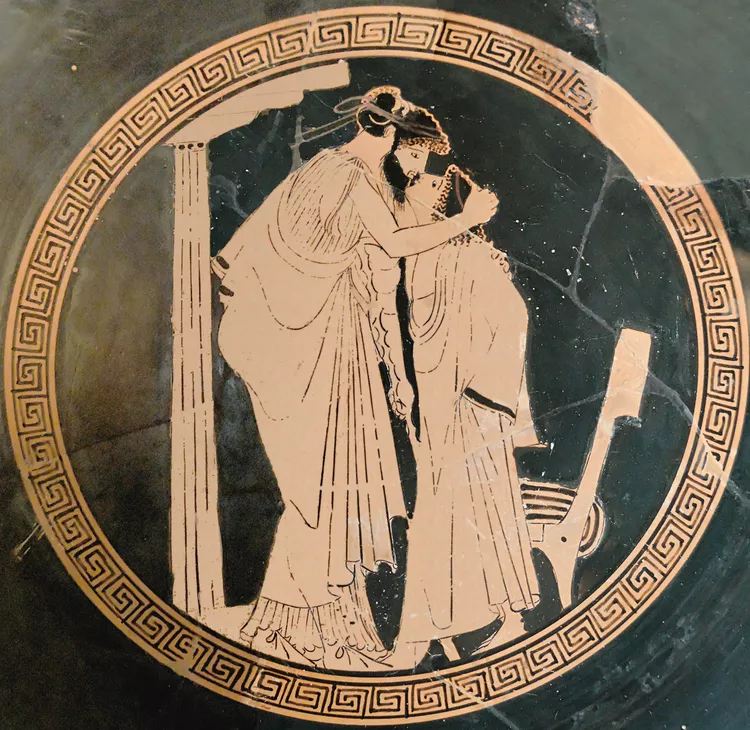Judith Butler Talks Zionism, Rhetoric

One of today’s most daring and divisive intellectuals recently graced campus with her presence. On Wednesday, Feb. 13, students packed Memorial Chapel to maximum capacity to hear Judith Butler speak. Butler, a post-structuralist philosopher who rose to fame in the early ’90s for her contributions to feminist and queer theory, provided what was for many an introduction to her studies in two other fields: Jewish philosophy and rhetoric.
Butler delivered a lecture entitled “Martin Buber’s Two Zionisms and the Question of Palestine,” drawing on Buber’s 1948 essay to elucidate contemporary concerns over what she sees as the current Zionist project. The lecture addressed the implications of a Zionism based on ethics, as opposed to one based on the acquiescence of deserved goods, these models’ implementations throughout the history of modern-day Israel, and the roles the legacies of the Holocaust and anti-Semitism play in such considerations.
Butler’s views on Judaism and Israel are hard to pin down conventionally without engaging with her theoretical work. She identifies as a member of the Jewish faith and attends the Kehilla Community Synagogue in Oakland, CA, but is strongly opposed to many aspects of contemporary Israel’s actions and has been variously identified as post-Zionist and anti-Zionist.
However, Butler expressed reluctance to embrace labels.
“I prefer to [provide] a story rather than a category,” Butler wrote in an email to The Argus. “I come from a strong zionist community in the [United States], and became critical of zionism starting in my early twenties….I am now working for what can only be called a post-zionist vision at this point in history. Perhaps at another point in history, I would be called a zionist, or even call myself that.”
The lecture was organized and funded by the Center for the Humanities (CHUM) in conjunction with the Social, Cultural, and Critical Theory Certificate as part of the former’s Monday night lecture series and the latter’s “In Theory” lecture series. Yet Butler’s presence on campus was not restricted to Wednesday’s talk: she also facilitated a faculty workshop, participated in a video interview with President Michael Roth, and dined with several students from the humanities departments and the online journal PYXIS.
The CHUM and Theory Certificate invited Butler to speak at Wesleyan following the controversies that arose after her reception of the Theodor W. Adorno Prize in 2012. Many protested the decision to grant Butler that honor given the content of her latest book, “Parting Ways: Jewishness and the Critique of Zionism.”
According to Director of the CHUM Ethan Kleinberg, those criticisms seemed to warrant further discussion.
“The members of the Theory Certificate and myself were talking about the ways that, in the criticism of Professor Butler’s stance, it was often the case that people would be criticizing her work as a theorist, or the language she used, or the thinkers she chooses to work on,” Kleinberg said. “We thought that was a weird conflation of the academic discussion and theorists as opposed to the political stance.”
Kleinberg explained that this was the rationale for inviting Butler to speak.
“We wanted to invite her here to give a talk so that we could engage with the intellectual and theoretical issues, and then also see how she moves from an engagement with these theorists to the political positions she holds,” he said.
The themes Butler discussed will further inform an upcoming conference on German-American political theorist Hannah Arendt and next semester’s theme of “Justice and Judgment” at the CHUM. Butler’s appearance has gotten the ball rolling on a lot of the theoretical conversations to take place on campus in the coming months.
“It wasn’t that we wanted to advocate for one position or another, but we thought this would be a great way of kick-starting some intense intellectual discussion on these issues,” Kleinberg said.
Butler visited the University soon after her much-publicized appearance two weeks ago at Brooklyn College. There, she spoke alongside other activists who support the Boycott, Divestment, and Sanctions campaign in a conference that brought about heated debate and calls to defund the school.
Kleinberg stated that this timing threw Wednesday’s lecture into an interesting light, but didn’t otherwise affect its substance.
“Obviously, [the Brooklyn College appearance] changed the complexion of her talk here, but that didn’t dissuade us from the necessity of allowing her to speak,” he said.
Regarding the controversies surrounding her appearances, Butler welcomed opposing opinions.
“I am always glad when people with a strong point of view feel that they can speak openly in public,” Butler wrote. “I [am] very much in favor of a robust public argument. I don’t need people to agree with me as much as I need them to engage in a serious and productive way.”
Her post-lecture Q&A at Wesleyan had its own dissenting comments, most notably from Professor Emeritus of Biology William Firshein. Firshein argued that Israel’s military actions are largely justified by the threats posed by surrounding Arab countries. However, the overall atmosphere was of intense interest in Butler’s theoretical focus.
Kleinberg mentioned that the student presence at Butler’s talk speaks to Wesleyan’s academic stature.
“Any time you can get 500-plus of your student body to come listen to a high-level intellectual talk that has a bearing on contemporary political concerns…[it] is a very good sign for a university as a zone of intellectual engagement,” Kleinberg said. “It [bodes] very well for our student body, and for Wesleyan as a place where high-level discourse happens.”
Butler, who pursued post-doctorate studies at the CHUM before teaching in the College of Letters for two years, seems to have a fondness for Wesleyan students’ enthusiasm for learning.
“I have found it to be an impressive community in every way,” Butler said. “The students seem open, serious, and curious, and the faculty feel really lucky to be here.”







Leave a Reply